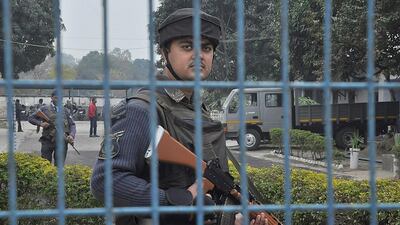NEW DELHI // Drawing on mobile phone call records, Indian security agencies have identified a Pakistan-based terrorist organisation as the coordinator of the January 1 attack on an airbase in Pathankot.
The six terrorists who stormed the airbase and fended off security forces until January 5 were all eventually killed. One civilian and seven soldiers died in the course of the attack.
Media reports have quoted anonymous Intelligence Bureau officials as saying that, through the duration of the siege, the terrorists used a cell phone – taken from one of their injured victims – to communicate with their handler in Pakistan.
The victim, a jeweller named Rajesh Verma, whose car was briefly commandeered by the terrorists on their way to the base, confirmed they made frequent calls from his phone to someone whom they addressed as “Ustaad,” or “Master”. Mr Verma’s throat was slashed and he was left for dead by the attackers, but survived.
India has named four members of the Jaish-e-Mohammad (JeM) terrorist group as suspected supervisors of the attack, including Maulana Masood Azhar, JeM’s founder. Security forces also found two Pakistan-made medicines on the bodies of the attackers.
Vikas Swarup, spokesperson for India’s ministry of external affairs, said on Thursday that this evidence had already been handed over to Pakistan.
“As far as we are concerned, the ball is now in Pakistan’s court,” Mr Swarup said. “The immediate issue in front of us is Pakistan’s response to the terrorist attack and the actionable intelligence provided to it.”
India has not called off the talks scheduled for January 15 between its foreign secretary S Jaishankar and his Pakistani counterpart Aizaz Ahmad Chaudhry, but Mr Swarup implied that there was still time for this to happen.
“There are eight days to go before January 15,” Mr Swarup said. “We had extended a hand of friendship to Pakistan, but we will not countenance cross-border terrorist attacks.”
Indian prime minister Narendra Modi told the cabinet on Thursday that bilateral talks must be linked directly to Pakistan’s intentions to act against terror outfits operating from its soil.
“Action is a must,” Mr Modi said. “We are going to be very strict about it.”
Founded in 2000, JeM has maintained a goal to separate Kashmir from India and make it part of Pakistan.
The group has been implicated in an attack on the Indian parliament in 2001, as well as in the 2002 murder of Daniel Pearl, an American journalist in Karachi.
India, as well as several other countries, including the UAE and the United States, have designated JeM as a terrorist organisation. Although Pakistan has ostensibly banned JeM as well, the group’s leaders – including Azhar – continue to operate from Pakistani soil.
On Tuesday, Pakistani prime minister Nawaz Sharif promised Mr Modi that “his government would take prompt and decisive action against the terrorists”.
The Pathankot attack occurred just as relations between India and Pakistan looked set to thaw, particularly after Mr Modi made a surprise visit to Lahore on Christmas Day for a meeting with Mr Sharif.
But following the attack, Mr Modi and his government are in something of a dilemma, said Arun Sahgal, a retired Indian army brigadier and a consultant at the Institute for Peace and Conflict Studies in Delhi.
“The government has invested a fair amount of political capital in restarting the stalled dialogue with Pakistan,” he said. “Now they will have to expend even more political capital – of which right now there is a dearth – to ensure that the talks continue.”
Primarily, Mr Sahgal said, the government will hope that Pakistan produces “some sort of credible information or credible action” against JeM in the week that remains before the talks begin in Bangkok. “If that happens, then India will have a window. The government can continue with the talks.”
But if Pakistan issues a denial of JeM’s involvement – as it did with the Lashkar-i-Taiba, another Pakistan-based terrorist group, after the November 26, 2008 attacks upon Mumbai – the dialogue will face greater jeopardy.
“If, somehow, Pakistan conveys that it couldn’t care less, then India will, out of political compulsion, have to roll back the dialogue process,” Mr Sahgal said. “At the moment, the government is trying its best not to bow down to pressure from the opposition, and it is trying to work with Pakistan to enlarge the window and to keep talking.”
ssubramanian@thenational.ae

